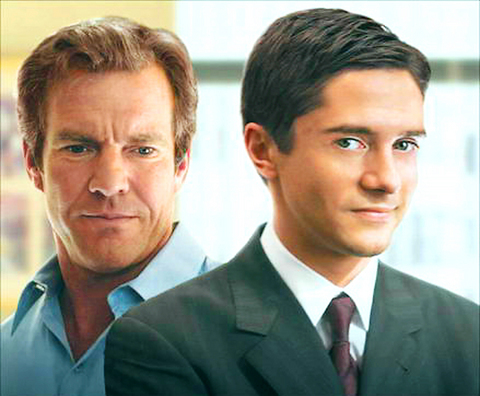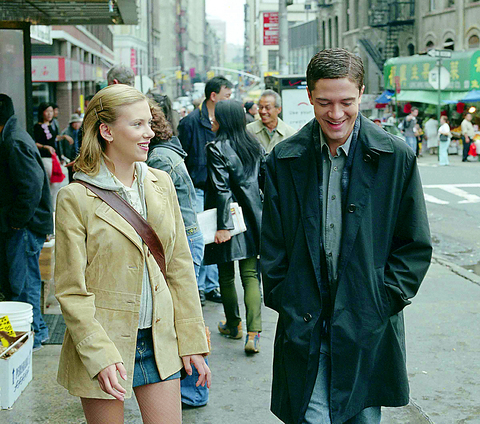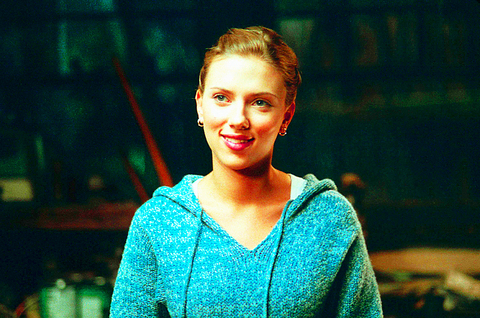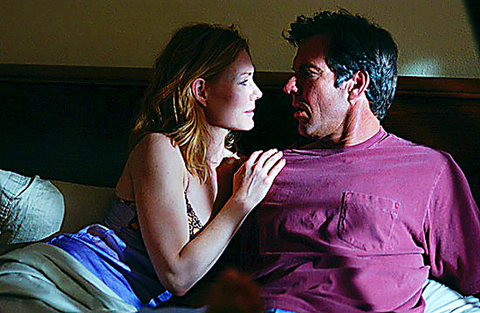The 26-year-old actor Topher Grace has the narrow build and jumpy bones of a young man still growing into his adult body, so much so that even when standing at rest, he seems poised to take a leap forward. That makes him an ideal fit for the nimble, engagingly lightweight drama In Good Company, in which a young executive, having been bumped up the ladder too fast, first loses, then finds his footing by standing on the sturdy shoulders of a seasoned professional played with winning solidity by Dennis Quaid.
Grace is Carter Duryea, a shark who's made his dubious reputation selling mobile phones to children and has been promoted to run the advertising department of a magazine with the resonant name of Sports America. The executive whom Carter is meant to make redundant is the 51-year-old Dan Foreman.
A ruggedly appealing adult man who brings out the best in everyone lucky enough to land inside his periphery, Dan has a picture-perfect family and the loyalty of those who work for him. He's an unabashedly old-fashioned masculine type, the kind of character Quaid has been slow-cooking to perfection over the years and which, on American screens at least, has lately gone missing.

Written and directed by Paul Weitz, In Good Company is a gently revisionist fairy tale about good versus evil set on the battlefield of contemporary corporate culture, a site of our leading blood sport. Mostly, though, the movie is about men: Men without fathers, men without sons, men with wives who work and make them feel like less than a man and men with wives who, like Dan's wife, Ann (Marg Helgenberger), give them the gift of both an exquisitely preserved figure and a fertile womb.
For Dan -- who rises at 4:30am to go to work so he can sustain his beautiful family in their beautiful home, who conducts business with a firm handshake and a squared jaw -- being a man isn't a roll of the genetic dice, an accident of birth; it's a calling.
In many respects, In Good Company is very much of a piece with Weitz's last feature, About a Boy, which he directed with his brother, Chris Weitz. (The two produced this new film themselves.) Based on the Nick Hornby novel, About a Boy traces the long-delayed maturation of a single man who, having resisted adulthood and all that it implies (namely, the steady love of one woman), is suddenly forced into caring for a young boy. A similar dynamic drives In Good Company.

Soon after Carter bumps Dan from his position and corner office, the older man discovers that his new boss can't hack it. Not simply because Carter lacks the requisite professional experience, but also and principally because he's just a kid rattling inside grown-up armor.
After Carter becomes involved with Dan's daughter, Alex (Scarlett Johansson), this nascent father-son relationship grows more complicated, if only on the surface. A sweetly superficial interlude, the couple's affair fizzes rather than sizzles, mostly because the love that really matters here isn't between Alex and Carter, but between Carter and Dan.
Like Ann, who holds up a flattering mirror to Dan, Alex exists mostly as a reflection of her lover's and her father's deeper selves. This is more of an observation than a strong complaint. The focus of In Good Company is decidedly on the men. But this is one of those unusual American movies in which the women, though manifestly marginal to the story's core meaning, have inner lives that linger long after the characters have served their purpose.

In Good Company lacks both the emotional sting and the bright pop-culture snap of About a Boy, as well as Hornby's carefully cultivated irony, but it makes for an agreeable solo-directing debut. Weitz has an easy commercial style that entertains without insult, and on the evidence of both this and his last film he has found a theme (masculinity and its complaints) that fits him like a glove.
If the screenplay veers toward the overly schematic, with Dan and Carter's lifelines forming geometrically calibrated parallel tracks, Weitz makes certain that the precise architecture of the story neither imprisons his characters nor dampens his sense of play. I don't believe for a single second how Weitz ends his fairy tale, but I mean it as a compliment to say that I wish I did.


JUNE 30 to JULY 6 After being routed by the Japanese in the bloody battle of Baguashan (八卦山), Hsu Hsiang (徐驤) and a handful of surviving Hakka fighters sped toward Tainan. There, he would meet with Liu Yung-fu (劉永福), leader of the Black Flag Army who had assumed control of the resisting Republic of Formosa after its president and vice-president fled to China. Hsu, who had been fighting non-stop for over two months from Taoyuan to Changhua, was reportedly injured and exhausted. As the story goes, Liu advised that Hsu take shelter in China to recover and regroup, but Hsu steadfastly

Taiwan’s politics is mystifying to many foreign observers. Gosh, that is strange, considering just how logical and straightforward it all is. Let us take a step back and review. Thanks to the Chinese Nationalist Party (KMT) and the Taiwan People’s Party (TPP), starting this year people will once again have Christmas Day off work. In 2002, the Scrooges in the Democratic Progressive Party (DPP) said “bah, humbug” to that. The holiday is not actually Christmas, but rather Constitution Day, celebrating the enactment of the Constitution of the Republic of China (ROC) on December 25, 1947. The DPP and the then pan-blue dominated legislature

Focus Taiwan reported last week that government figures showed unemployment in Taiwan is at historic lows: “The local unemployment rate fell 0.02 percentage points from a month earlier to 3.30 percent in May, the lowest level for the month in 25 years.” Historical lows in joblessness occurred earlier this year as well. The context? Labor shortages. The National Development Council (NDC) expects that Taiwan will be short 400,000 workers by 2030, now just five years away. The depth of the labor crisis is masked by the hundreds of thousands of migrant workers which the economy absolutely depends on, and the

If you’ve lately been feeling that the “Jurassic Park” franchise has jumped an even more ancient creature — the shark — hold off any thoughts of extinction. Judging from the latest entry, there’s still life in this old dino series. Jurassic World Rebirth captures the awe and majesty of the overgrown lizards that’s been lacking for so many of the movies, which became just an endless cat-and-mouse in the dark between scared humans against T-Rexes or raptors. Jurassic World Rebirth lets in the daylight. Credit goes to screenwriter David Koepp, who penned the original Jurassic Park, and director Gareth Edwards, who knows